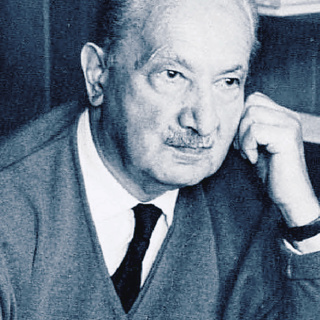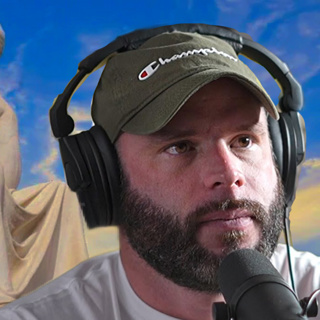
Special Episode: Nietzsche Podcast Reading Guide
Don't worry, we're still doing Dialectic of Enlightenment next week, but my tour schedule and personal demands on my time (I'm moving) prevented me from finishing a full episode before departing for another week. Thankfully, I had this reading guide finished and decided to release it now. Back next week with a full length episode. Cheers!
8 Heinä 16min

116: Nietzsche’s Inaugural Address - Homer & Classical Philology
Nietzsche's inaugural lecture at Basel, given in 1869, provides an insight into the young Nietzsche's mind. Surprisingly, even here we find the groundwork laid for his later philosophical project. Nietzsche takes on the issue, rather esoteric and focused on the internal debates of classical philology, of whether or not Homer really existed, and what this means the discipline of philology if he did not exist.
1 Heinä 1h 33min

Untimely Reflections #36: Tony of 1Dime - The Neoliberal Zeitgeist
I met up with Tony of 1Dime to discuss the neoliberal moment in American culture. We discuss what neoliberalism means, why there is a general discontent with it, the advantages of neoliberalism, and the potential of a vision for a future beyond neoliberalism as it inevitably comes to an end. We also psychologically analyze the left and the right from the Nietzschean standpoint, consider how many of the alternatives are magical thinking, and finally discuss the history of revolutionary movements and how they always have to draw upon the past.
24 Kesä 2h 1min

115: Martin Heidegger, pt 3 - Will to Power as Knowledge & Metaphysics
Finally, we reach the conclusion of our exploration of Heidegger's lectures on Nietzsche. This time we consider another lecture on will to power, from Volume II of Heidegger's collected lectures on Nietzsche, in which will to power is considered instead as a framework for knowledge, and the principle of a new valuation.
17 Kesä 1h 51min

114: Martin Heidegger, pt 2 - The Will to Power as Art
Continuing with Heidegger, we consider his first lecture on Nietzsche, "The Will to Power as Art", in which Heidegger gives an unorthodox but very enlightening reading of will to power, then hinges the second half of his argument on a passage where Nietzsche describes art as will to power's most perspicuous manifestation.
10 Kesä 1h 34min

113: Martin Heidegger, part 1 - On Nietzsche & Dasein
In this episode, we begin a three-part series on Martin Heidegger and his reading of Nietzsche. The episode begins with a discussion of the background of Heidegger's life and ideas, as well as a brief tour of the content of Being & Time in which we look at Dasein, temporality, care, being-towards-death among other core concepts. In the latter half of the episode, we turn towards an introductory discussion of how Heidegger sees Nietzsche & his place within the Western philosophical tradition, as well as his comments about the necessity of the interrelation between will to power and the eternal return.
3 Kesä 1h 58min

Untimely Reflections #35: Uberboyo - Politics as Neuro-Physiology
An Irishman named Stef visited Austin recently. We met for a discussion about the revaluation of values, strange brain experiments with magnets, Gnosticism and its relation to the politics of castration, the brain's threat detection matrix as creating the "hard times strong men" cycle, the possibility of neuro-physiological centrism, and how this all relates to Dionysus v/s the Crucified.
27 Touko 1h 53min

Response to Philosophy Tube
This episode is an upload to Spotify of my response to Abigail Thorn's "Was Nietzsche Woke?" video. This video was previously uploaded to Youtube.Watch me spend more time than the entire length of Abigail Thorn's video explaining why it is a superficial hit piece based on strained, bizarre arguments and outright false information. There are many "creative omissions" in Philosophy Tube's video, "Was Nietzsche Woke?": rather basic information about Nietzsche's life and his ideas is left out that would completely one's view of the information presented. In this rebuttal, we'll look at the statements in Nietzsche's own published works in Human, All Too Human (1878), Daybreak (1881), The Gay Science (1882), Beyond Good & Evil (1886) Ecce Homo (1888) & Twilight of Idols (1888) as well as selections from Nietzsche's letters, his essays, and unpublished notes assembled in Will to Power. Philosophy Tube's video relies almost entirely on secondary sources and clearly does not derive from a direct engagement with the actual texts. While I actually have read all of the primary source material, I also reference the following secondary sources in this video:The Legend of the Anti-Christ: A History by Stephen J. Vicchio (2009)Nietzsche, Philosopher, Psychologist, Antchrist by Walter Kaufmann (Fourth Edition, Princeton University Press, 1974)Nietzsche's Women: Beyond the Whip by Carol Diethe (2013, De Gruyter)I was also informed in my study by the biographies provided by Krell & Bates, as well as Curtis Cate and the work of Charlie Huenemann. Stephen Hicks' book, Nietzsche and the Nazis, while I disagree with it on many points, was also helpful in elucidating the difference between Nietzsche's view of Christianity versus that of the Nazis. Also, Robert Solomon helped contextualize the common views around eugenics in 19th century Europe.
13 Touko 1h 8min






















